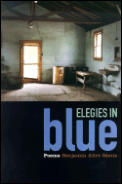
From my dictionary's defintion for elegy:
French élégie, from Latin elega, from Greek elegeia, from pl. of elegeion, elegiac distich, from elegos, song, mournful song.
This third book of poetry (and some prose) by Chicano poet, Benjamin Alire Sáenz is remarkable, beautiful and mournful. It is an astounding, touching and reflective look at life on the El Paso border told by someone who was born and raised there. The book is also an homage to people, from the infamous like Pancho Villa, to Cesar Chavez, to the author’s father-in-law to JFK.
All the work bears the lyrical stamp of Mr. Sáenz. He has a special knack for creating the most simple and beautiful lines on a page. I always find myself stopping to read a certain passage, a stanza again, to read it aloud just to be swept away by the sheer grace and raw power of it. Take for instance this section in his poem What Was It All For Anyway, Cesar Chavez?
“Flattering strategy. You wore that word out Injustice.
It made you sound accusing and superior. Not smart
Cesar, people got nervous. People hated you
Because you spelled it out – one lettuce
At a time.”
In the prose-like
American Camps, he speaks eloquently of a boy in a picture he finds in a library, a boy with intelligent eyes, behind barbed wire. He speaks of the hidden histories, obscure ethnic histories.
I loved the poem
At the Grave of Pancho Villa. I especially loved the line
“Well better bullets than cancer
for a General.”
My favorite of all the poems and to me, the most strikingly elegiac was
The Blue I Loved. It was truly a lovely and haunting in its warm and vibrant imagery.
The poetry in this book is filled with rage, indignation, pride, community, righteous anger and political voice. Any Chicano worth his salt should run over to Cinco Punto’s website and buy it. Don’t just buy it – read it, feel it, love it and then read it again and again.


